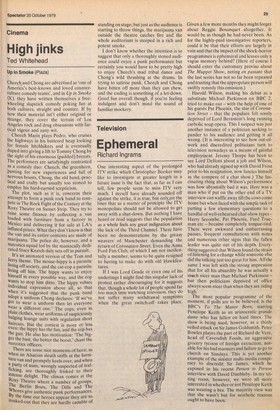Ephemeral
Richard Ingrams •
One interesting aspect of the prolonged ITV strike which Christopher Booker may like to investigate at greater length in a future issue is the fact that, as far as I can tell, few people seem to miss ITV very much. I myself have already sounded off against the strike, it is true, but only_on the lines that as a matter of principle the ITV monopolists should not be allowed to get away with a shut-down. But nothing I have heard or read suggests that the population as a whole feels any great indignation about the lack of the Third Channel. There have been no demonstrations by the greasy weavers of Manchester demanding the return of Coronation Street. Even the Anna Ford Fan Club, of which I am not incidentally a member, seems to be quite resigned to having to make do with old Hawkfeatures.
If I was Lord Grade or even one of his underlings I might find this singular lack of protest rather discouraging for it suggests that, though a whole lot of people spend far to much time watching television, they do not suffer many withdrawal symptoms when the great switch-off takes place. Given a few more months they might forget about Reggie Bosanquet altogether. It would be as though he had never been. As for the highly-paid investigative reporters, could it be that their efforts are largely in vain and that the impact of the shock-horror programmes is ephemeral and leaves only a vague memory behind? (Here of course I should enter the customary proviso about The Muppet Show, noting en passant that the last series has not so far been repeated and trusting that the appropriate person will swiftly remedy this omission.) Harold Wilson, making his debut as a substitute Michael Parkinson on BBC 2, tried to make out — with the help of one of his guests Pat Phoenix, the star of Coronation Street — that the populace felt sorely deprived of Lord Bernstein's long running carbolic soap opera. This I suspect was just another instance of a politician seeking to pander to his audience and getting it all wrong. (It is interesting to see how out-ofwork and discredited politicians turn to television nowadays as a means of gainful employment. Jeremy Thorpe has been to see Lord Delfont about a job and Wilson, who had already signed up with David Frost prior to his resignation, now fancies himself as the compere of a chat show.) The fascinating thing about Wilson's performance was how abysmally bad it was. Here was a man who if put on the other end of a TV interview can waffle away till the cows come home but when faced with the simple task of putting a few elementary questions to a handful of well-rehearsed chat-show types — Harry Secombe, Pat Phoenix, Fred Trueman etc — became completely tongue-tied. There were awkward and embarrassing pauses, frequent consultations with notes and numerous other signs that the fallen leader was quite out of his depth. Everything suggested that Wilson found the strain of listening for a change while someone else did the talking just too great for him. All the same I was left with the strong impression that for all his absurdity he was actually a much nicer man than Michael Parkinson — but then politicians deprived of office always seem nicer than when they are riding high.
The most popular programme of the moment, if polls are to be believed, is the BBC's To The Manor Born, starring Penelope Keith as an aristocratic grande dame who has fallen on hard times. The show is being used, however, as a thinly veiled attack on Sir James Goldsmith. Peter Bowles playes the part of Richard de Vere, head of Cavendish Foods, an aggressive grocery tycoon of foreign extraction, notable for his bad manners and failure to go to church on Sundays. This is yet another example of the sinister multi-media conspiracy to discredit Sir James, which he exposed in his recent Person to Person interview with David Dimbleby. In my sitting room, however, we were all more interested in whether or not Penelope Keith was wearing a bra. The majority view was that she wasn't but for aesthetic reasons ought to have been.






































 Previous page
Previous page